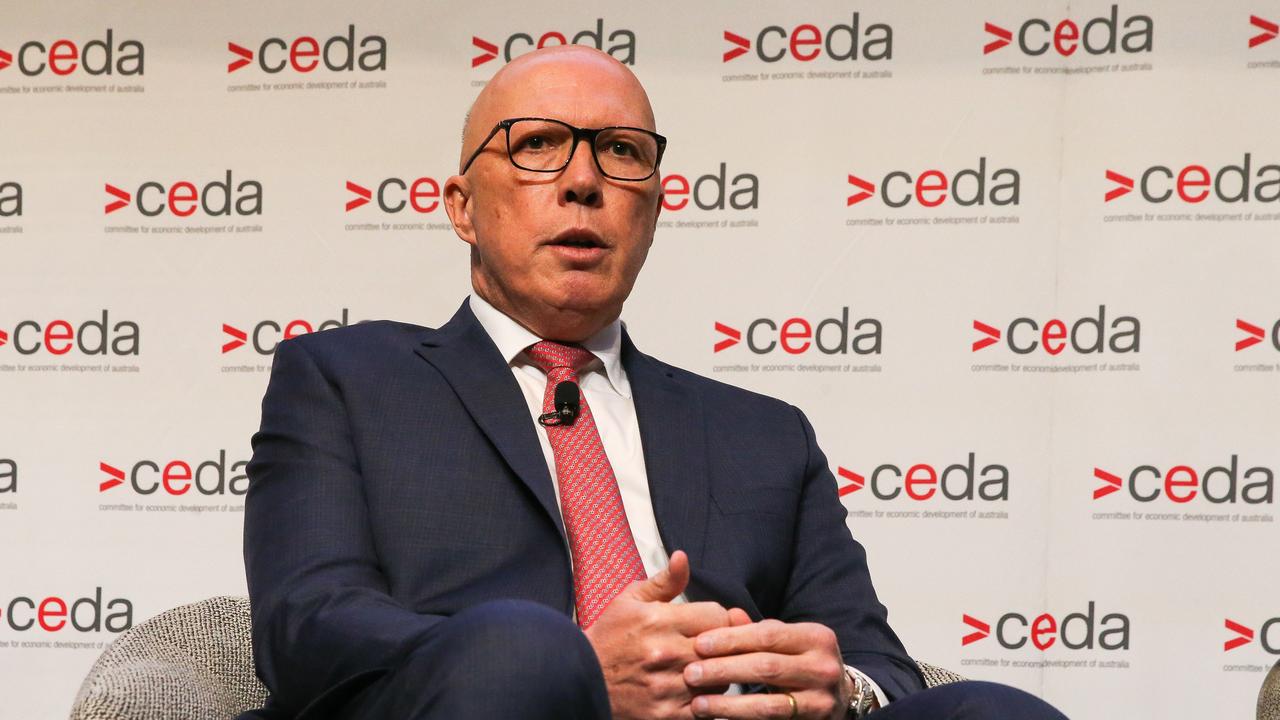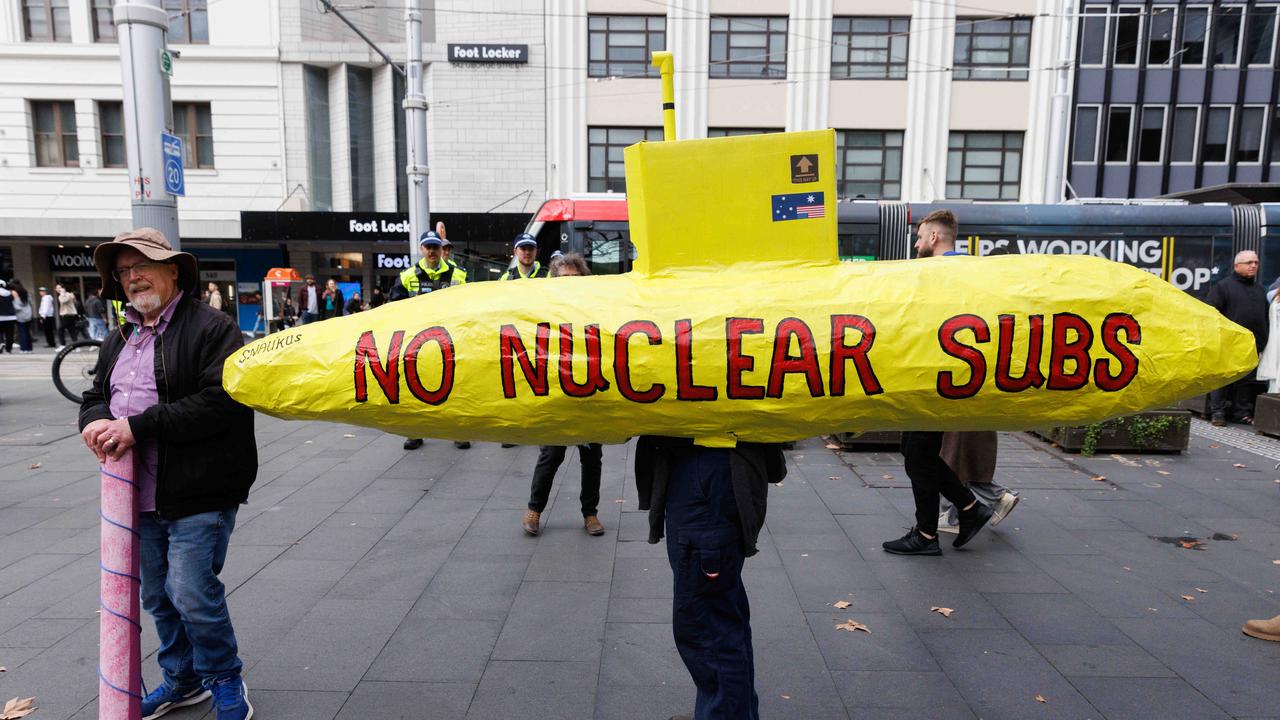Peter Dutton ducks cost question on Coalition’s nuclear reactor plan
While Peter Dutton has chosen not to reveal the cost of the Coalition’s plans to build seven nuclear reactors, he has made one big claim.
Opposition Leader Peter Dutton has vowed the Coalition’s election pledge to build seven nuclear reactors will cost less than what he claims are Labor’s $1.3 trillion renewable energy strategy, but he has again declined to give anymore costing details.
However, the $1.3 trillion price tag has been disputed by Labor, which says the Australian Energy Market Operator (AEMO) has costed the building of the wind and solar generators, plus the storage and transmission lines at an investment of $121bn up until 2050.
Mr Dutton made the remarks in his speech to the Committee for Economic Development of Australia on Monday, where he said the Coalition would “release our costings in due course – at a time of our choosing”.
However, he said he would be “upfront about the locations of our nuclear sites, we will be upfront about the cost of nuclear energy” and it would be independently costed.
He added a nuclear reactor’s 80-year lifespan would work out to be cheaper than solar and wind projects that would need to be replaced every 25 to 40 years.
The oldest operating nuclear power plant, the Swiss Beznau nuclear power plant, is 55 years old.
“Yes, our nuclear plan does have a significant upfront cost, but a whole new and vast transmission network and infrastructure won’t be needed. Moreover, the cost of our nuclear plants can be amortised and spread over a reactor’s 80-year lifespan,” Mr Dutton said.

“Under Labor’s renewables-only plan, every solar panel and wind turbine will need to be replaced three to four times over the same period.”
Mr Dutton also said embracing nuclear was Australia’s only chance to reach its 2050 net-zero target, which would require a mix of energy sources.
Australia’s energy mix is currently composed of about 40 per cent renewables, with aims to increase it to 82 per cent by 2030.
He also ruled out implementing a cap on the contribution of renewable energy to Australia’s grid.
“I think what we want to achieve is an outcome where we have a proper mix, where we have an eye on price,” he said.
COALITION SUPPORT FOR GAS
Mr Dutton also acknowledged it would take time for Australia to move to nuclear, flagging the Coalition’s support to increase Australia’s domestic gas production.
“We can’t switch nuclear power on tomorrow, even if the ban was lifted overnight,” he said.

“Like other countries, we need to ramp up our domestic gas production in the more immediate term to get power prices down and to restore stability to our grid, but what we can do is also ensure that Australia doesn’t miss the nuclear train.”
Mr Dutton said Australia needed to rely on “domestic gas production in the more immediate term” despite its unpopularity with the teals and Greens,
“You do need more gas, and we’ve been very clear about our desire to improve the approval processes while still being environmentally responsible and bringing more of those projects on more quickly,” he said.
DUTTON LASHES RENEWABLES
During his speech, Mr Dutton attacked a “renewables only” approach that he said would be “disastrous” and was “doomed to fail”.
He said a “renewables-only energy policy” was “an act of economic self-harm” and argued Australia should generate its energy in Australia.
He cited energy bills in California where residents paid the “highest residential electricity prices in the US” despite having solar and wind account for more than 49 per cent of its energy mix.
Mr Dutton also said “weather-dependent energy cannot power a nation”, adding that nuclear energy would produce more energy with less land.
His comments follow backlash from farmers and regional communities who say transmission line developments have reduced land values.
“In other words, the nuclear plant delivers the same energy using less than 1 per cent of the land needed for solar,” he said.
“With nuclear, there’s no need to carpet our landscape and coastline with industrial-scale solar and wind farmsor the 28,000 kilometres of new transmission lines needed to make them work.”

DUTTON: STATES COULD COME ONBOARD
Mr Dutton also flagged South Australia and its Premier Peter Malinauskas as a potential ally in helping the Coalition achieve its policy.
“I think with South Australia, we could strike a deal very quickly. The only reservation Peter Malinauskas has expressed about nuclear is in relation to cost, and I believe that we can deal with those concerns,” he said.
Looking to the other states, where premiers have said they don’t plan on removing their moratorium on nuclear projects, Mr Dutton believed state leaders would be “pragmatic and sensible.”
“I think there is an arrangement that can be struck very quickly with state governments who I think are pragmatic in private,” he said.
“There are many in the Labor Party who are tearing their hair out at the approach of the government, which is being dictated to by the Greens”.

NUCLEAR TO CREATE THOUSANDS OF JOBS
Mr Sutton said a nuclear strategy would also create “thousands” of new jobs and claimed more than 75 per cent of coal workers would be able to transfer their skills and experience to working in nuclear plants.
Taking aim at Labor, he called for bipartisan support for the nuclear plan, as it was in the “country’s best interests”, and cited the Coalition’s recent support for Labor’s reforms to aged care and the NDIS.
Labelling the plans as a “truly visionary” policy, that would guarantee Australia’s energy security, Mr Dutton also called on Labor to stop its “juvenile arguments against nuclear.”
“The test now is whether Labor will join with us in an undertaking which is transformational for our economy,” he said.
“Nuclear energy is reliable and it will underpin renewables. It will underpin economic success for a generation.”
On Sunday, Treasurer Jim Chalmers labelled the Coalition’s nuclear promise plan as “economic insanity”.
“It costs more, it will push power prices up, it will take longer, it will only at best deliver a sliver of what we need in energy, and it will turn Australia’s back on our unique combination of advantages,” he said.
“He is a big risk to energy and to power prices in this country. The fact that he’s not prepared to release those details I think should ring alarm bells for every Australian. It’s time for him to come clean.”
Recent modelling from the Institute of Energy Economics and Financial Analysis also revealed nuclear power would increase energy bills by an average of $665 across Australia.
‘MATURE CONVERSATIONS’ AROUND NUCLEAR NEEDED
Mr Dutton called for a “mature conversations” around Australia’s energy mix, and said Labor was currently too concerned about losing votes to the Greens.
“Unfortunately, our national interest is running second and that is not a feature in the US, whether Democrats and Republicans are committed to the inflation,” he said.
He said the current conversation had focused too much on “short-termism” and said nuclear would provide a “coming together opportunity”.
“We supported the NDIS, as I pointed out before, and as I said to Anthony’s great credit, they supported AUKUS from opposition, which wasn’t an easy position,” he said.
“But having done that … the obligation on the Labor Party is to join us in a factually based conversation and allow people to make a judgment about it.”
Originally published as Peter Dutton ducks cost question on Coalition’s nuclear reactor plan





